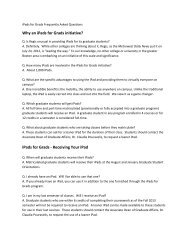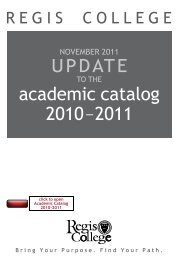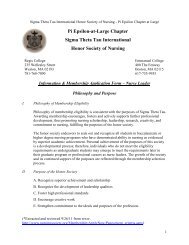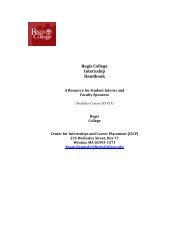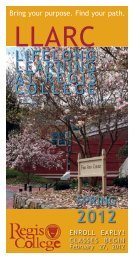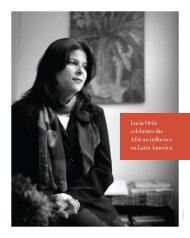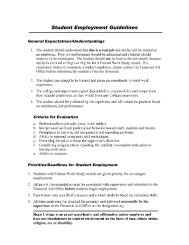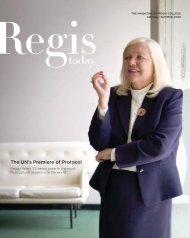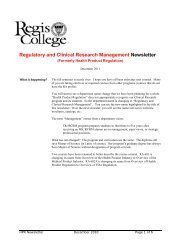Create successful ePaper yourself
Turn your PDF publications into a flip-book with our unique Google optimized e-Paper software.
With her broad background and experience,<br />
not only as a doctor but also as a public policy planner<br />
with an insider knowledge of the insurance<br />
industry, England became a sought-after adviser<br />
on health care on the national level.<br />
In 1990, England moved to Washington, D.C.,<br />
taking over as president of Washington <strong>Business</strong><br />
Group on Health. During these years, she worked<br />
with Hillary Clinton and her staff and collaborated<br />
closely with Tipper Gore and with Rosalynn and<br />
Jimmy Carter. She and Rosalynn worked together<br />
on legislation with Senator Kennedy.<br />
“Rosalynn and I met when I was president of<br />
the American Psychiatric Association. I was lobbying<br />
on the Hill a lot, and we became advocates together.<br />
We both have the same mission,” says England,<br />
“to provide mental health and substance use care<br />
for everybody.”<br />
Their friendship has endured the passing years<br />
and the changing tides in health reform. When<br />
England became president of <strong>Regis</strong> she invited<br />
Carter to campus to receive an honorary degree<br />
at the presidential inauguration convocation.<br />
} People<br />
call this decade a transformational<br />
period for <strong>Regis</strong>. And<br />
it has been so because of England. When she arrived<br />
in 2001, the future of <strong>Regis</strong> looked dim. Its enrollment<br />
was shrinking and so was its endowment. Many<br />
small colleges were closing their doors, and it looked<br />
as if <strong>Regis</strong> might follow suit.<br />
“Small liberal arts colleges are destined to go out<br />
of business if they don’t adapt,” says England. “We’ve<br />
adapted by building on our strengths and growing<br />
our nursing program, especially at the graduate<br />
level. If we didn’t have it, the liberal arts program<br />
would be out of business.”<br />
Before establishing a doctoral program in nursing<br />
practice in 2007, the college established the excellence<br />
of its undergraduate major in nursing and<br />
broadened the base of its course offerings with<br />
a health-care orientation. The multiple-entry graduate<br />
nursing program offers various master’s programs<br />
and has a healthy enrollment. It is turning<br />
out masters- and doctorally trained nurses who are<br />
taking on needed leadership roles in public health,<br />
nursing education, and administration, and it has<br />
been named a Center for Excellence in Nursing<br />
Education—the first such school in New England<br />
to receive this honor. “I’m very proud of the focus<br />
on health in our graduate programs,” says England.<br />
“It meets the needs of the community.”<br />
This shift into building up the health science<br />
offerings was a deliberate and farsighted choice<br />
for England. She believes that Boston is a locus for<br />
health-care related industries, and thus health-care<br />
related jobs. She wants <strong>Regis</strong> students to have those<br />
employment options.<br />
“So much of contemporary science is directly related<br />
to the health-care field,” says England. “The sciences<br />
used to be isolated, but medical schools have integrated<br />
them, nursing schools are integrating them.”<br />
This shift in academic offerings and focus, along<br />
with immediate and strict cost cutting, helped <strong>Regis</strong><br />
turn the corner economically. But it wasn’t enough.<br />
“We weren’t growing fast enough,” she says.<br />
“When we looked at the data, we saw that women<br />
were coming to <strong>Regis</strong> not because it was an allwomen’s<br />
college, but because we had nursing or<br />
some other specific program. A lot of women’s colleges<br />
were going coed at the time.”<br />
So she put the issue of coeducation on the table,<br />
again (it had been discussed, seriously, several times<br />
in <strong>Regis</strong>’s history). And, typically, pursued a careful<br />
feasibility study so that any change at the college<br />
could follow the evidence.<br />
In the past, <strong>Regis</strong> had been one of only a few good<br />
Catholic colleges for women in the Boston area, but<br />
since the 1970s it had been competing with formerly<br />
all-male Catholic schools like Boston <strong>College</strong> and Holy<br />
Cross, which had gone coed and attracted women,<br />
who increasingly desired a coed college experience.<br />
So despite her personal wish that <strong>Regis</strong> continue<br />
as an all-women’s school, England saw with the<br />
impartial eye of a scientist that accepting men would<br />
stem the erosion of undergraduate enrollment.<br />
She knew this would be a difficult change for<br />
alumnae, and she dealt with it as she did all the<br />
important changes she implemented—slowly and<br />
with lots of conversation and input from all quarters.<br />
The faculty supported it, but it was a harder sell to<br />
some alumnae.<br />
“The older alums took it much better,” she says.<br />
“Their own children didn’t want to go to women’s<br />
colleges. The recent alums found it harder. But we<br />
spent a lot of time with them. It was all transparent.<br />
We worked it through for a year and a half.”<br />
Now, going on four years since <strong>Regis</strong> went coed,<br />
the student body is 25 percent male. And as predicted,<br />
as the male student numbers have increased,<br />
so have female applicants.<br />
The student body is also very diverse—both in<br />
ethnicity and religious affiliation. Now 50 percent of<br />
<strong>Regis</strong> students are minorities, and only 50 percent<br />
are Catholic.<br />
This shift in student population wasn’t planned,<br />
says England. Rather, there was a shift in Greater<br />
Boston’s population. <strong>Regis</strong> still educates the children<br />
of working- and middle-class families from<br />
13<br />
FALL 10



